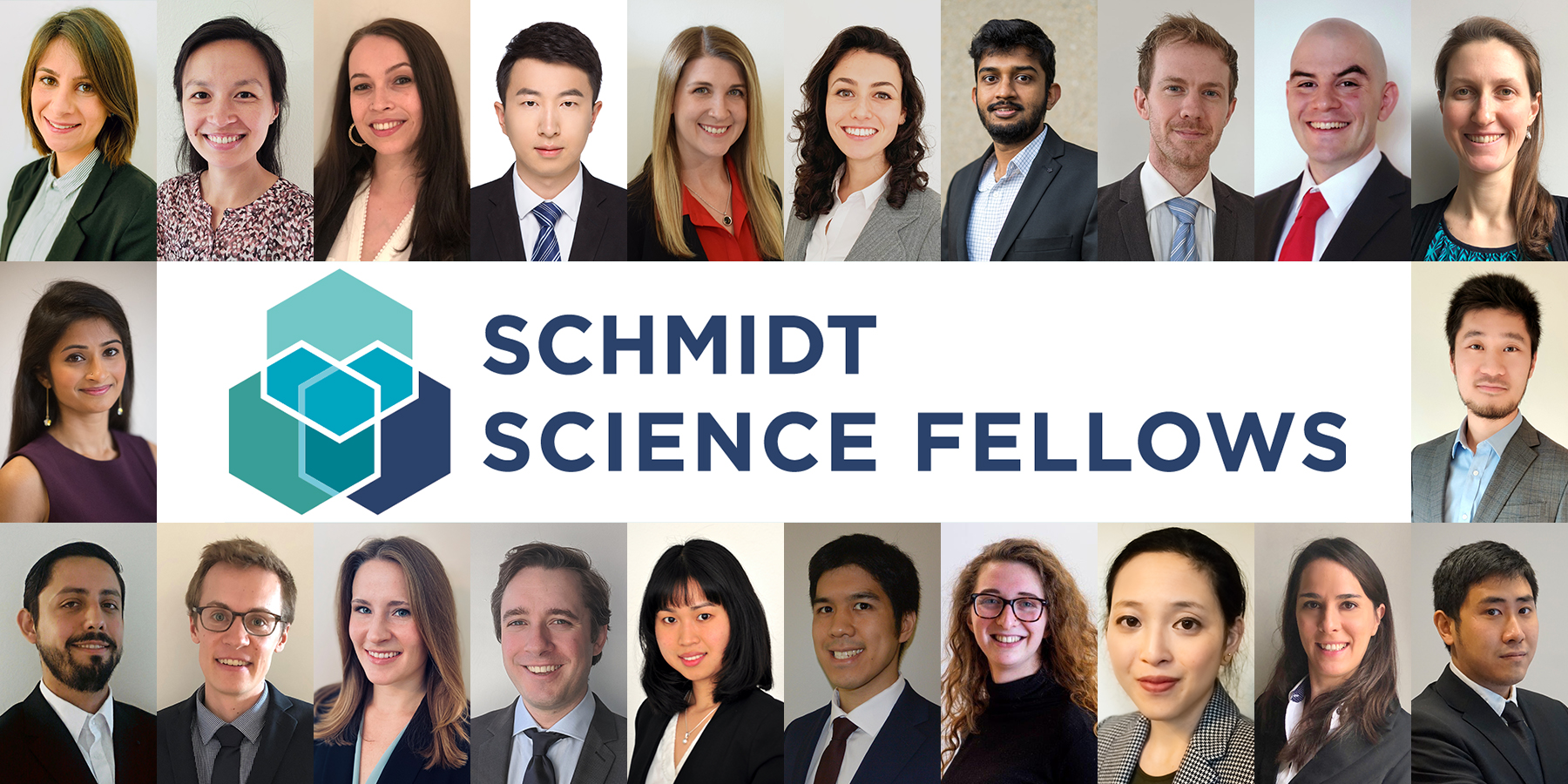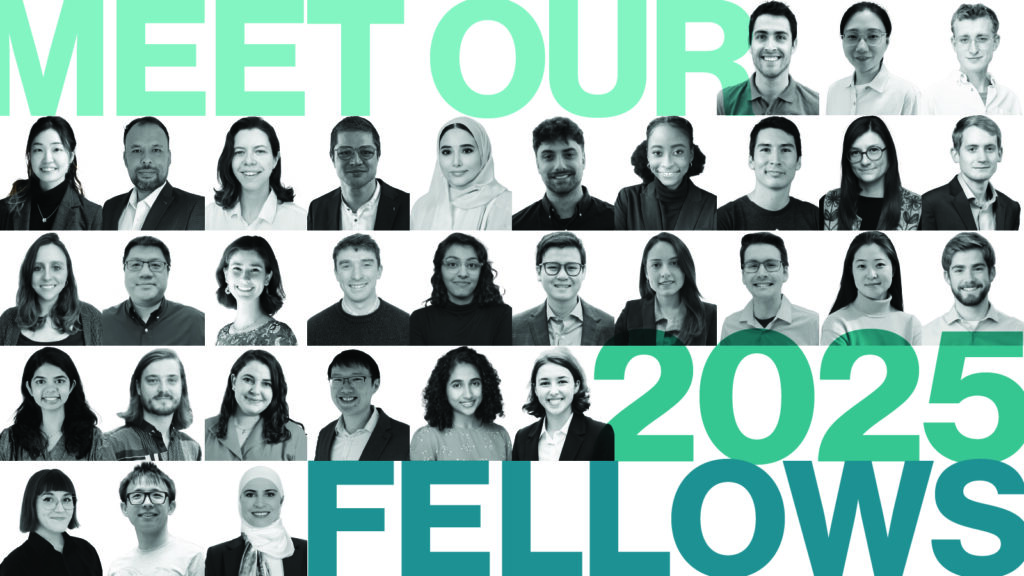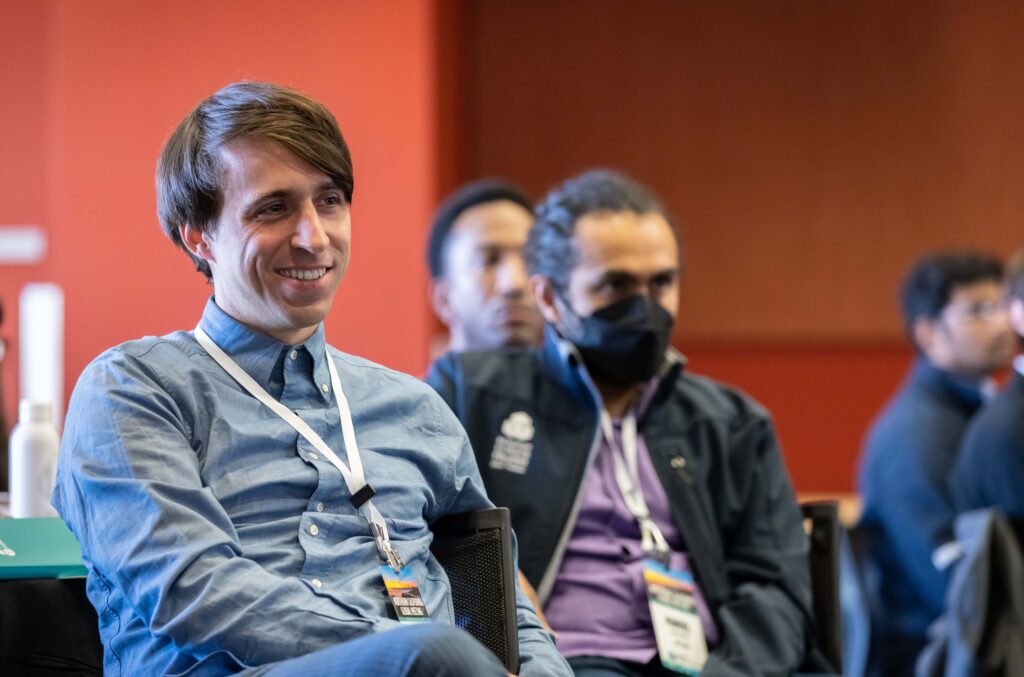Cohort of 22 early-career interdisciplinary Fellows is third to join the Schmidt Science Fellows community and Wendy Schmidt announced today the 22 early-career scientists who comprise the third cohort of Schmidt Science Fellows, a program of Schmidt Futures, in partnership with the Rhodes Trust. The new Fellows aim to harness interdisciplinary approaches to tackle long-term societal challenges, including infectious disease, climate change, and biodiversity loss.
Entering its third year, the growing community of Schmidt Science Fellows now numbers more than 50 emerging interdisciplinary science leaders. Members of previous cohorts are now pursuing roles in universities, start-up companies, not-for-profits, and national research institutes and are part of a lifelong Fellowship community.
The 2020 Schmidt Science Fellows and their nominating institutions are:
- Mar Cabeza-Cabrerizo, The Francis Crick Institute
- Jacqueline Campbell, University College London
- James Chen, The Rockefeller University
- Andrea d’Aquino, Northwestern University
- Yang Guo, Tsinghua University
- Kirsten Hall, Johns Hopkins University
- Gabriella Heller, University of Cambridge
- Kalli Kappel, Stanford University
- Deepak Krishnamurthy, Stanford University
- Jennifer Lai, Dartmouth College
- Sofia Landi, The Rockefeller University
- Phuong Le, University of Illinois Urbana-Champaign
- Callan Luetkemeyer, University of Michigan
- Amy Shepherd , University of Melbourne
- Fernando Soto , University of California San Diego
- Shriya Srinivasan, Massachusetts Institute of Technology
- Andreas Wallucks, Delft University of Technology
- Oliver Watson, Wellcome Trust/Imperial College London
- Ben Winer, Princeton University
- William Witt, Princeton University
- Yuanzhao Zhang, Northwestern University
- Evan Zhao, Princeton University
Specific details on each 2020 Fellow, including their research interests and ambitions, are listed below.
The 2020 Schmidt Science Fellows represent eight nationalities and 17 nominating institutions.“As the need for rapid and innovative scientific discovery and response grows more urgent during this global pandemic, we are convinced now, more than ever, there is tremendous value in recruiting the most promising scientific minds to apply their intellectual rigor and investigation to additional disciplines,” said Wendy Schmidt, co-founder of Schmidt Futures, “These exceptional early-career scientists join a growing community of Schmidt Science Fellows working to make transformative contributions, including new ways to fight against pandemic pathogens. Eric and I are excited to see what they can accomplish together.”
“The current crisis has shown us the importance of scientists working across disciplines and engaging with society and policymakers,” said Eric Schmidt, co-founder of Schmidt Futures, “This new group of Schmidt Science Fellows demonstrates our commitment at Schmidt Futures to investing in talented people who can make the world a better place, in the long run and even during some of the most challenging times in recent memory.”
The Fellows were selected following a rigorous, multi-stage application and interview process. This culminated in final-stage video interviews that the Program held due to the COVID-19 pandemic. In lieu of the in-person interviews of previous years, Selectors and candidates joined from across eight time zones around the world.
Dr. Megan Wheeler, Schmidt Science Fellows Executive Director, commented: “Training the next generation of interdisciplinary scientist-leaders and helping them achieve their potential for the world has never felt more important than it does today. We are incredibly grateful to our Selectors and candidates for working with us in recent weeks to deliver a robust, online process to select this high-caliber cohort of Schmidt Science Fellows from around the globe.”
Schmidt Science Fellows are supported to pursue a postdoctoral research placement at a world-leading laboratory anywhere in the world. This placement must be in research at a significantly different discipline from the Fellow’s PhD, with the aim of exposing them to ideas and skills that will help them examine scientific problems and approaches from different perspectives and to accelerate discoveries.
Each Fellow receives a $100,000 stipend and is paired with an internationally accomplished and experienced senior scientist as a mentor. Schmidt Science Fellows attend Global Meetings as a group during their Fellowship Year at international science and innovation clusters. These convenings enable Fellows to engage with new concepts, to visit leading science facilities, and to engage with renowned thought-leaders from science, business, policy, and society.
The Schmidt Science Fellows program is supported by many leading science, engineering, and technology institutions around the world. In addition to the institutions that host Fellows for their placements, many others are involved through the identification and nomination of candidates and by contributing to Global Meetings.2020 Schmidt Science Fellows – additional information
Mar Cabeza-Cabrerizo, The Francis Crick Institute
Mar studies the role of dendritic cells in the human immune system and, in particular, their role in colonizing tissue infected by influenza or cancer and then sending signals to expand the dendritic cell network to provide an effective immune response. She developed new techniques for quantifying the dendritic cell clusters in 3D. As a Schmidt Science Fellow, Mar wants to develop a new method for non-invasive imaging of the human immune system in real-time. By being able to visualize immune cells in diseased tissues in individual patients by a new non-invasive technique, she aims to help us better understand the functioning of disease and the immune system to improve existing therapies.Jacqueline Campbell, University College London
Jacqueline is a planetary scientist who used her PhD study to hunt for signs of the building blocks of life in dust on Mars. She established limits on these hydrocarbons that are exposed by dynamic processes on the Martian surface. Now, Jacqueline is planning to move from looking at the surface of Mars to the oceans of Earth. As a Schmidt Science Fellow, she aims to combine long-term satellite observations with ocean samples and marine wildlife observations to produce local and global maps of ocean water chemistry. By bringing together new studies with historic data sets, Jacqueline will help us to understand the impact of ocean acidification on biodiversity and inform new strategies to prevent the loss of marine species.
James Chen, The Rockefeller University
During his PhD, James used cryo-electron microscopy to study single RNA polymerase structures for several important bacterial pathogens and demonstrated the importance of this technique for understanding this mechanism. As a Schmidt Science Fellow, James plans to combine structural biology with genetics and cell-imaging to investigate some of the fundamental biological processes involved in latent malaria, where dormant parasites take hold in the liver.
Andrea d’Aquino, Northwestern University
Andrea develops synthetic molecules that can assemble into structures that resemble the behavior of natural proteins. By mimicking the ability of a protein to adapt its structure and function in response to environmental changes, these synthetic molecules have many potential applications. As a Schmidt Science Fellow, Andrea will pivot into biomedical engineering and aims to develop biomaterials for controlled drug delivery to treat diseases such as diabetes.Yang Guo, Tsinghua University
Yang is an environmental engineer with strong policy interests. During his PhD, he explored options for the decarbonization of energy infrastructure for China’s many industrial parks and modeled the economic and environmental benefits of greenhouse gas mitigation measures. As a Schmidt Science Fellow, Yang plans to explore the benefits of linking energy and water infrastructure by harnessing the sludge and treated water from wastewater treatment plants as alternative fuel and unconventional water source for thermal power plants.
Kirsten Hall, Johns Hopkins University
Kirsten is an astrophysicist interested in the evolution of galaxies over all of cosmic time. During her PhD, she combined state-of-the-art datasets with advanced theoretical modeling to uncover the relationship between star-forming galaxies and dark matter and to measure the impact of growing supermassive black holes on their host galaxies. As a Schmidt Science Fellow, Kirsten now aims to move into climate science to use her expertise with large datasets to convert raw data from atmospheric monitoring satellites and ground-based data into actionable information. By being able to trace emissions back to their sources, she hopes to improve vitally important climate models.
Gabriella Heller, University of Cambridge
Gabriella is a computational biologist who used her PhD to utilize high-powered computational approaches to probe how drugs interact with a class of disease-causing proteins in the body called disordered proteins. These proteins are challenging to target with drugs as they rapidly change their structure. As a Schmidt Science Fellow, Gabriella aims to pivot into experimental structural biology to uncover the rules of binding viral disordered proteins. She aims to work towards approaches for drug design that could offer entirely new opportunities for antiviral treatments.
Kalli Kappel, Stanford University
Kalli has used computational approaches to overcome experimental challenges to characterize a wide range of hitherto unresolved RNA-protein structures and to improve our understanding of some important biological processes, such as chromosome maintenance and RNA splicing. As a Schmidt Science Fellow, Kalli plans to employ high-throughput single-cell transcriptomics, cellular imaging, and computational modeling to explore the production of RNA-protein condensates. These are involved in some fundamental biological processes, but also in certain diseases, such as Huntington’s disease, which involve repetitive DNA sequences.Deepak Krishnamurthy, Stanford University
Deepak’s science focuses on the physics of biology. During his PhD he made a discovery about the swimming mechanics of the human schistosomiasis parasite that provides new insights into how it infects us. He also invented a new 3D tracking microscope that allows researchers to follow the movements of microscale ocean plankton over relatively vast vertical distances. As a Schmidt Science Fellow, Deepak aims to combine molecular and computational science to reveal how genetic and biochemical mechanisms in tiny, single-cell ocean organisms permit them to sense gravity and affect their behaviors. This work will help us to understand better the impact of our changing oceans on every scale of marine life.
Jennifer Lai, Dartmouth College
Jennifer is a biomolecular engineer who, through her PhD, has been designing next-generation vaccines that selectively target immune responses to a specific virus vulnerability. This approach avoids the risk of a vaccine antibody inadvertently enhancing a disease. Jennifer is planning to pivot into computational science to use high-throughput tools and analytical methods to investigate how the antibody response develops over time during pregnancy and influences early immunity in young infants.
Sofia Landi, The Rockefeller University
Sofia’s research is concerned with uncovering poorly understood mechanisms in our brains that underpin how we recognize faces, and in particular, molecular and structural differences between how we perceive strangers and people we know well. During her PhD she discovered two previously unknown regions of the brain specifically involved in recognizing familiar faces. Now, Sofia will pivot into understanding how our memory works, exploring the connections between how our brains navigate the world and episodic memory. Episodic memory allows us to recall events from our past, and Sofia hopes to uncover more about how our brain allows us to mentally time travel through our map of memories.
Phuong Le, University of Illinois Urbana-Champaign
Phuong completed her PhD in biological imaging, developing a new technology that combines innovative quantum dot nanotechnology and single-molecule counting to provide new insights into cancer and inflammation at single-cell and single-protein scale. This imaging technology is helping us to understand how environmental inputs trigger cell fate, such as division or cell death. As a Schmidt Science Fellow, Phuong has an ambitious interdisciplinary plan to combine her bio-imaging technology experience with stem cell modeling and functional genomics to identify early markers and the time progression for neurodegenerative diseases such as Alzheimer’s.
Callan Luetkemeyer, University of Michigan
Callan is a mechanical engineer and used her PhD to develop new models of the anterior cruciate ligament, aiming to improve injury prevention strategies that are currently based on overly simple existing models. As a Schmidt Science Fellow, Callan will pivot into biology to work on the extracellular matrix in our tissues. When this is damaged in soft orthopedic tissues it can lead to chronic pain, but the point at which stress to the matrix leads to damage is not well understood. Callan hopes that her work could lead to ways to detect microdamage in tissues well before a significant injury.Amy Shepherd, University of Melbourne
Amy is a behavioral neuroscientist interested in improving interventions for sufferers of diseases such as Alzheimer’s. During her PhD, she developed and characterized a touchscreen-based mouse model to help us better understand and expand the effectiveness of similar assessments and therapies used with human patients. As a Schmidt Science Fellow, Amy plans to study the role of the millions of neurons in the human gut and the link between gastrointestinal symptoms and neurological disease. She believes that understanding the interplay between specific gut-resident nerve cells, the immune system, and the gut could improve our understanding of many brain and gut disorders.
Fernando Soto, University of California San Diego
Fernando is a nanoengineer who has developed microengines the size of a human cell. His research includes designing, building, and powering these tiny engines. Fernando wants to pivot his research to the development of programmable materials to create autonomous biorobots. By integrating responsive synthetic materials into biologically inspired structures that could operate across scales he aims to design robots where responsive materials generate movement or action. These robots could perform tasks too difficult, dangerous, or inaccessible for humans.
Shriya Srinivasan, Massachusetts Institute of Technology
Shriya is a biomedical engineer who has pioneered new approaches to help individuals requiring amputation to restore the sense of touch and feeling in prosthetic limbs. The methods she developed have been translated to the clinic and are already benefiting patients, delivering improved quality of life. As a Schmidt Science Fellow, Shriya wants to pivot her science to focus on gastrointestinal motility disorders, which can prove debilitating for millions of people around the world. She aims to investigate the underlying mechanisms of smooth muscle stimulation and then develop new solutions, including optically driven micro-devices that could be swallowed.
Andreas Wallucks, Delft University of Technology
Andreas spent his PhD working on new information storage techniques for quantum technology. He created a macroscopic entangled system using very delicate new micro-fabricated silicon devices which, when cooled to near absolute zero temperatures, stored information in the form of laser-pulse induced vibrations. As a Schmidt Science Fellow, Andreas is planning to pivot his research into optical sensors. He aims to develop optical detectors that can identify very low concentrations of biomolecules with potential applications for disease-detecting healthcare devices.Oliver Watson, Wellcome/Imperial College London
Oliver is an infectious disease modeler who has used mathematical models to demonstrate the uses and limitations of malaria genetics to develop and evaluate different control interventions for the disease. His software has been used by numerous health authorities in Africa to help plan their malaria campaigns. As a Schmidt Science Fellow, Oliver aims to make a contribution to our understanding of drug-resistant malaria by pivoting to systems biology and bioinformatics. He seeks to quantify the genetic background of previous emergence of malarial drug resistances to predict the risks posed today.
Ben Winer, Princeton University
Ben’s PhD involved developing advanced human liver tissue culture models and humanized mouse models to study how the Hepatitis B virus establishes chronic infections. Hepatitis B viral infections are otherwise very difficult to investigate in the lab. Ben aims to use his time as Schmidt Science Fellow to take a systems biology approach to explore how migratory immune cells navigate the body. By understanding at a molecular level how individual cells interpret external chemical cues for proper guidance, he hopes to advance knowledge in immunology, infectious disease, and cancer biology.
Chuck Witt, Princeton University
During his PhD, Chuck has worked on ways to improve computer simulations of the behavior of atoms within materials. He helped to overcome challenges in computer processing of models involving many atoms through advancing orbital-free density theory. As a Schmidt Science Fellow, Chuck aims to use machine learning techniques to simulate very large-scale polymer systems and to develop new plastics. He hopes that this work could lead to plastic products that maintain useful qualities while reducing harmful effects, such as microplastic pollution.
Yuanzhao Zhang, Northwestern University
Yuanzhao is interested in developing theories to predict collective behavior in complex systems. This ranges from the synchronous flashing of fireflies without a leader to neurons unleashing avalanches of firing activities while processing information. During his PhD, he focused on the theory of synchronization in coupled oscillator networks and showed how disorder can restore synchrony. As a Schmidt Science Fellow, Yuanzhao aims to combine dynamic modeling and experimental data to study the benefits of cell heterogeneity on the circadian clock. He hopes this work could lead to new ideas to treat sleep disorders.
Evan Zhao, Princeton University
Evan is a chemical engineer who has utilized timed light to control and then engineer microbes to produce new, valuable chemicals without the need for fossil fuel-based precursors. As a Schmidt Science Fellow, he is now pivoting to work on RNA sensing in cells for medical applications. Evan aims to utilize a cell’s ability to sense its environment to develop a sensor that could control the production of therapeutic proteins within the cell, tailoring treatment to a patient’s specific needs.About Schmidt Science Fellows
Schmidt Science Fellows, in partnership with the Rhodes Trust, aims to develop the next generation of science leaders to transcend disciplines, advance discovery, and solve the world’s most pressing problems.
We provide our Fellows with the skills and perspectives to harness and accelerate their exceptional scientific talents. Schmidt Science Fellows engage and coproduce with diverse thinkers in science, politics, society, and business to catalyze new ideas and connections.
Our Fellows are part of a community of lifelong fellowship and collaboration, between each other and with the cross-disciplinary networks they develop during the Fellowship year.
Working with partners in science, policy, and society Schmidt Science Fellows are helping to shape the future of scientific culture, training, and discovery.
About Schmidt Futures
Schmidt Futures is a philanthropic initiative, founded by Eric and Wendy Schmidt, that finds exceptional people and helps them do more for others together. We knit talent into networks, bet on the most promising ideas through diverse forms of competition and support, and equip people to scale through partners and modern tools.
To realize this vision, Schmidt Futures uses a broad set of tools — including gifts, grants, investments, and startup activity — for charitable, educational, and commercial efforts with a public purpose.
About the Rhodes Trust
The Rhodes Trust, based at the University of Oxford, brings together and develops exceptional people from all over the world, and in all fields of study, who are impatient with the way things are and have the courage to act.
The Rhodes Scholarships are postgraduate awards providing transformative educational opportunities. Established in 1903, they are the oldest and perhaps the most prestigious international graduate scholarship programme in the world. Nearly 8,000 Rhodes Scholars have gone on to serve at the forefront of government, education, the arts, NGOs, commerce, research and other sectors. They are well known advocates for expanded social justice and have advanced the frontiers of science and medicine. The Rhodes Trust provides the Rhodes Scholarships in partnership with its Second Century Founders, John McCall MacBain O.C., The Atlantic Philanthropies, and many other generous benefactors.
In recent years the Rhodes Trust has also partnered with several other remarkable organisations to create:
- The Mandela Rhodes Foundation, focused on providing postgraduate educational opportunities and building exceptional leadership capacity in Africa.
- The Atlantic Institute, acting as a knowledge sharing and supportive hub for the seven interconnected Atlantic Fellows programs, assisting this diverse community of leaders working to advance fairer, healthier, more inclusive societies.
- The Schmidt Science Fellows program, seeking to expand the horizons of the next generation of leaders and innovators in the natural sciences, engineering, mathematics, and computing.
- The Rise program, an initiative of Schmidt Futures and the Rhodes Trust, which will build a network of exceptional young people who are committed to helping others throughout their lives.



